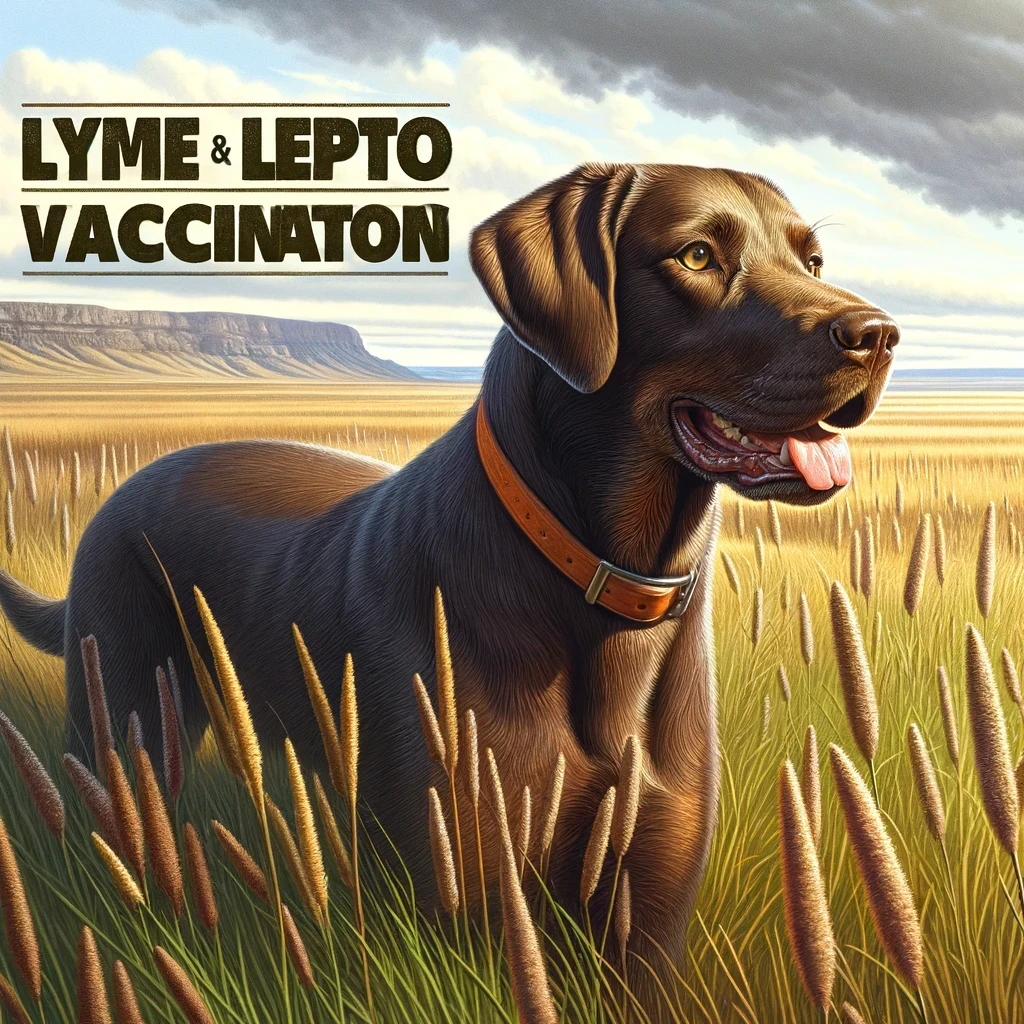The world of vaccines has always been somewhat muddied and along came COVID which further created a chaotic and polarizing topic out of something that has literally saved millions of lives, human and animal. It seems we live in a world of extremes and vaccine opinions are no different. As with most things though the truth lies somewhere in the middle. There are necessary vaccines, optional vaccines and some that shouldn’t exist. These are often referred to as core vaccines (recommended for all dogs) and optional vaccines (based on lifestyle and risk factors). Likewise, within each of those categories there are good products and bad products. The key is determining what is right for your situation and your dog.
I’m going to go on the assumption that if you read at least this far we are probably all using at least the core vaccines (rabies, distemper, parvo, etc.) and open to further discussion. I’m not going to cover every vaccine option in this article but rather tackle the question I frequently get asked. What is my take on Lyme and Leptospirosis vaccinations and whether to use them or not.
There are a couple of things to understand about vaccines before we dive into those two diseases. The first is that the core vaccines (rabies, distemper, parvo) are for viruses and the duration of immunity – the time the vaccine lasts – is much longer than with bacterial vaccines. This is why we have a three year rabies product and the rest of the viral diseases are generally three years as well. Lyme and Lepto are both bacteria. In most cases our vaccine interval for bacterial diseases is yearly and honestly the duration of immunity is probably even less than that. This has nothing to do with a failure of product but rather the differences between how each of these attacks the body and how the body mounts its defense.
Lyme disease, caused by the bacterium Borrelia burgdorferi and transmitted primarily through the bite of infected ticks, is a prevalent concern in regions where ticks thrive. It can lead to symptoms ranging from mild flu-like malaise to severe joint pain and neurological complications if left untreated. Leptospirosis, on the other hand, is a bacterial infection caused by various strains of the Leptospira genus. This zoonotic disease often spreads through contact with water or soil contaminated by the urine of infected animals, particularly rodents. Its symptoms can vary widely, from mild flu-like symptoms to severe liver and kidney damage, and even death in severe cases. Both diseases pose significant risks to both canine and human health, underscoring the importance of preventive measures such as vaccination and tick control.
When I’m making a decision about whether to vaccinate or not the first question I ask is about exposure. Lyme disease is a regionalized issue, though it is spreading as you can see in this animated map from the CDC (https://www.cdc.gov/lyme/datasurveillance/lyme-disease-maps.html). I lived in the heart of tick-borne disease country at the start of my career and quite honestly, we saw so much tick-borne disease that I didn’t understand how veterinarians made money if they didn’t live in tick country. When I lived in those areas, and if I lived there today, I would vaccinate without question. For me the question is for the dogs that hunt in the area occasionally.
Disclaimer – there is no research or studies to support or contradict my recommendations on this front, but this is what I do in these situations. For dogs that make one trip a year, say a week of chasing ruffed grouse, a family vacation, or a trial in tick country, I’m usually not pushing vaccine for those dogs. In those situations, I am having a discussion on tick control and prevention and usually at least doubling up my preventatives (usually an oral combined with either a topical or collar) and in some cases I will do a short course of doxycycline during the time of potential exposure. In the face of concerns over antibiotic resistance this is a practice I’m reconsidering. For dogs that make multiple or extended trips to tick country or in the case with families that live most of the year in non-tick borne disease country but have a cabin in tick country I’m recommending vaccination for those dogs.
One key point to note is that the only tick-borne disease that we have a vaccine for is Lyme and so in all cases tick prevention and control is still recommended to help combat the other diseases that we see and worry about.
Leptospirosis is a little more nuanced disease. Leptospirosis is caused by various serovars (strains) of the Leptospira bacterium, with over 300 serovars identified worldwide. These serovars may differ in their geographic distribution, host specificity, and virulence. Canine vaccines for Leptospirosis typically target a select few serovars most commonly associated with disease in dogs, such as Leptospira interrogans serovars Canicola, Icterohaemorrhagiae, Grippotyphosa, and Pomona. While these vaccines may not cover every possible serovar, they are strategically formulated to provide broad protection against the most clinically significant strains. Additionally, some degree of cross-protection may occur, where vaccination against certain serovars can confer immunity against related strains. However, it’s important to note that no vaccine provides complete protection against all possible serovars, highlighting the ongoing challenges in Leptospirosis prevention and control.
Early in my career it was thought of as a disease of hunting dogs and farm dogs. As our population has grown, and with it, urban sprawl, we now see it in all classes of dogs with those living in relatively new housing developments being at a very high risk. When I first moved to South Dakota we did not see the disease, though we tested for it regularly, in the last 10-15 years we have seen an incredible increase in the incidents, and we consider it to occur regularly in our practice. For this reason, we also recommend Leptospirosis vaccination to all of our patients. Again, had you come to my practice 15 years ago that would not have been the case.
In the past, there has been historical caution surrounding the use of Leptospirosis vaccines due to reports of adverse reactions, including mild to severe allergic responses. Some earlier formulations were associated with higher rates of adverse events, leading to hesitancy among pet owners and veterinarians. However, in recent years, significant advancements have been made in vaccine technology and formulation. Vaccine manufacturers have focused on refining their products to minimize adverse reactions while maintaining efficacy. These efforts have led to the development of newer generation Leptospirosis vaccines with improved safety profiles. Modern formulations are generally well-tolerated by dogs, with adverse reactions occurring infrequently and typically mild in nature. While no vaccine is entirely risk-free, the overall safety profile of Leptospirosis vaccines has greatly improved, alleviating many of the concerns associated with their use. In our practice I don’t believe that we have seen any more reaction since the addition of Lepto as part of our core recommendations.
I will say that this is one area that all products are not created equal. We do not carry all of the same brand of vaccines and have a mix of products based on efficacy and lack of reactions. Economically it would make sense to carry everything from one manufacturer. Unfortunately, we haven’t found one company to have the magic bullet across their product line and so we mix. What I mean here is that our rabies manufacturer is different from our distemper/parvo product is different than our Lepto. Technology and products change, and this mix has also changed over the years and something we are again currently looking at. It’s important to understand why veterinary practices may choose to use different vaccine brands, and should primarily be based on considerations of efficacy and safety rather than solely economic factors. Veterinary professionals should carefully evaluate the scientific evidence supporting each vaccine’s effectiveness and safety profile, selecting those that best align with their patients’ needs and health outcomes. While economic considerations are important, the primary focus should remain on ensuring that the vaccines administered provide optimal protection against preventable diseases while minimizing the risk of adverse reactions.
Given what we do with our hunting dogs, and where we do it, in my mind there is no question that they should be vaccinated against Leptospirosis. One excuse I have seen against vaccines is that it is a “treatable” disease. While this is true there are a couple of things to consider on that front. The first is that it also can be a fatal disease. It can also be a very expensive disease to treat in the severely affected dogs as many will require multiple days of hospitalization and supportive care. The other factor to consider is that it is transmissible to people, and I know of several cases of transmission to humans from veterinary patients. The flip side is that vaccinated dogs can still become infected with the bacteria. In my experience, though, they have milder course of disease.
One of the major reasons I decided to devote myself full-time to the online platforms with GunDogDoc are for discussions like this. So often we want a black and white definitive answer and in the case of living things it often is not that simple. With everything there are pros and cons, and a decision should be reached based on the information that is available and your particular situation. With these particular vaccines, the decision for Lyme is based on exposure, geography and travel and with Lepto, while I feel all hunting dogs should be vaccinated against the disease, there are also potential issues with the vaccine due to the complex nature of the disease.
It’s crucial to emphasize the significance of considering individual circumstances and available information when making vaccination decisions for your hunting dogs. Each dog’s lifestyle, geographical location, and potential exposure risks should be carefully evaluated in consultation with a trusted veterinarian. Additionally, staying informed about the latest developments in vaccine research and understanding the specific benefits and risks associated with each vaccine can empower pet owners to make well-informed decisions that prioritize the health and well-being of their beloved companions.
The important points to note:
- Vaccines for viruses and bacteria are quite different.
- Lyme vaccine decisions should be made based on location and exposure risk.
- Tick control is still vitally important.
- Leptospirosis is a complicated organism.
- Lepto vaccination is recommended for hunting dogs but is not a perfect guarantee.



